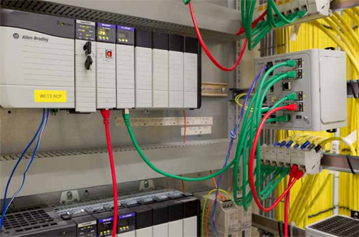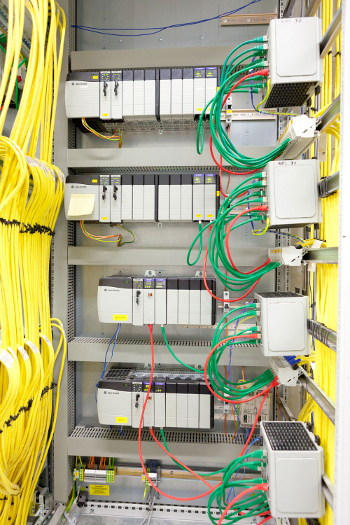Food maker’s Germany facility doubles production, improves quality and traceability by using integrated automation on a single EtherNet/IP network.
With 650 employees, the Nestlé factory in Biessenhofen is one of the company’s larger facilities in Germany, and is recognized as a competence center for producing hypoallergenic baby food. The factory also produces the Alete and Beba brands of cereal pastes, clinical liquid nutrition, NescaféXpress coffee-based drinks and Thomy sauces.
In 2009, Nestlé expanded the factory and more than doubled its production capacity. Rockwell Automation, which already works with Nestlé on a global level, was involved in equipping the new site early on in the project, including control cabinets, control systems and AC drives. Production started in summer 2011.
The food industry’s production methods are oriented towards market demands, among other factors. Manufacturers must be able to react fast to new situations, maintain transparency in increasingly complex production processes and monitor costs.
The daily work at Nestlé Biessenhofen includes carefully selecting raw materials, processing them with the highest levels of precision, and maintaining constant quality control at various stages of production. Needless to say, the hygiene and quality control standards go far beyond the standard legal requirements.
Rockwell Automation supplied and installed control cabinets, 50 ControlLogix PACs with the appropriate switches, and about 150 PowerFlex AC drives at Nestlé’s Germany plant.
The Company’s Goal
Nestlé wanted to introduce a fully integrated solution in a completely new facility and automate it from start to finish.
The project involved automating the sterile filling and packaging sections and the manufacturing area. Producing hypoallergenic baby food is such a complex process that it would be hard to manage without computer-aided process controls operating within very narrow tolerance levels. Every stage of the process has to be managed, monitored and documented.
Nestlé set several strategic and technological goals for the automation project, including the optimization of tolerance levels and the ability to easily reproduce processes. Another goal was to improve quality assurance, verification and batch traceability.
The company also wanted to increase the flexibility of machine and process functions. On the operational level, Nestlé needed to minimize losses and night shifts while reducing labor costs and throughput times. The Biessenhofen plant also was tasked with optimizing the production surface area, inventory and general monitoring costs.
Standardized Ethernet at the Core
Nestlé’s leaders believed the standardized Ethernet approach was crucial for the installation, because it facilitates the planning and visualization of the whole production process. Process monitoring is made easier in the I/O network by centralized switches that help to optimize availability and detect any issues before they cause machine failure.
Performance and flexibility of the field devices — and their integration — was another reason the Nestlé project team selected Rockwell Automation.
“Nestlé has already implemented several projects with Rockwell Automation and Endress+Hauser,” notes Florian Schreyer, automation engineer at Nestlé. “Both companies have tailored their products and systems to the specific requirements of the food manufacturing industry. Their worldwide availability helps to support systems and applications throughout their life cycle.”
To support seamless production processes, Rockwell Automation was asked to supply and install control cabinets, 50 Allen-Bradley® ControlLogix® programmable automation controllers (PACs) with the appropriate switches, and about 150 PowerFlex® AC drives (0.75kW to 315kW).
All the automation technology is based on ControlLogix and includes FieldCare (the plant asset management tool from Rockwell Automation Strategic Alliance company Endress+Hauser), PowerFlex drives with a safe torque-off feature, Flex I/O™ and POINT I/O™, EtherNet/IPTM, Stratix and integrated switching technology.
The EtherNet/IP solution supports end-to-end processes throughout the production plant and facilitates the integration of the network and field devices into the Rockwell Automation environment.
“Almost as soon as the team at Nestlé started talking about EtherNet/IP, Endress+Hauser became part of the equation,” says Manfred Rothen, sales manager for Germany at Rockwell Automation. “The collaboration between Endress+Hauser and Rockwell Automation, and the two companies’ strategy and product development, made it clear that we were well aligned with the direction Nestlé wanted to take.”
Endress+Hauser had already installed new EtherNet/IP technology at the start of the Biessenhofen project when it implemented its Promass Coriolis flow measurement system, which fit in seamlessly with the planned Rockwell Automation concept.
Outstanding Results
The Biessenhofen project has been a success for all involved. Along with the hardware, Rockwell Automation also provided the system design via its Solutions and Services Business, and made sure it complied with the highest standards. The company also produced the control cabinets and delivered them, ready for installation, to Nestlé. This helped save a significant amount of time on hardware commissioning.
The production staff and managers at Nestlé have high expectations for sustainable and trouble-free production. The factory benefits from structured and modularized automation technology, facilitating rapid and flexible system extensions. Also, the types of system and technology in Biessenhofen can be used globally, helping to support the system’s long-term manageability.
Rockwell Automation and Endress+Hauser provided a proven, integrated system. “As a result, the user can analyze real-time data from the production plant in higher-level business systems. This helps customers improve their plant efficiency and transparency — and that translates into real cash savings,” concludes Dion Bouwer, product manager of Fieldbus Systems, Endress+Hauser.
The Nestlé team’s use of industry-standard solutions makes maintenance work and system adjustments much easier. “We’re expecting EtherNet/IP to be future-proof,” says Schreyer. “It has delivered the huge benefit of giving us centralized access to most of the information from the plant floor.”
[info] www.rockwellautomation.com [/info]



